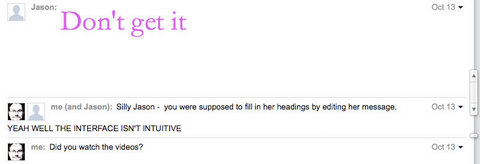Google Wave: The moral equivalent of sliced bread

So far, there seems to be a bit of schism here at ZDNet over the utility of Google Wave. Sam Diaz sees some real usefulness in reducing email clutter and getting at the meat of his inbox. The jury is still out for Dion Hinchcliffe. And our resident dinosaur, Jason Perlow, doesn't get it. He said so himself on a few Waves as we tested the collaboration tools:
Jason's big concern? That Wave will be the next incarnation of Gmail:
While I can see where this type of collaboration process may have some merit, I REALLY do not want to see this become part of GMail, because that is the natural evolution of what I am seeing, at least with this technology preview.
Maybe Jason "gets it" more than he lets on. This is precisely where email is headed. As Sam Diaz asked, "Remember when people used to ask you if you had e-mail? Now, it’s just assumed, right?" Just as email clients were a natural evolution of PINE, and Gmail was a natural evolution of various flavors of webmail, so is Wave a natural evolution of Gmail. Increasingly, there is a very thin line indeed between IM, email, collaborative tools, and social media, even in business settings. Wave simply focuses real time collaboration and communication into conversations that can be organized, searched, changed, revised, commented upon, and used.
Where Jason sees a "useless piece of crap", I see something a little different (and happily edited his remarks in a Wave in which we were both participating:
Jason calls Wave a "hosting site for disposable, single-purpose based Wikis and mashups" like that's a bad thing. Although I think his characterization is a bit limiting, the idea of creating a searchable, archivable flow of information with my colleagues kicks email conversations (as well-organized as they are in Gmail) in the keister. In fact, Gmail starts to feel a bit primitive when you get used to the immediate feedback and interaction inherent in a Wave (and yet don't lose the strengths of asynchronous communication that email affords).
While almost everything Jason points out in terms of beta quirks are true (although I found the embedded search that allows users to leverage Google Image and Video search within a Wave to be fast and intuitive), a little refinement will go a long ways towards making Wave the groupware model of choice, especially within Google Apps shops. Right now, for example, if I simply need to send someone outside my organization an email, I probably won't start a Wave over it. Integration of some Gmail features would obviously be useful for one-off communications. Similarly, you can't just start a Wave with anyone in the same way you can't use Google Video chat with someone who isn't using Gmail. Being able to host a Wave and invite outside participants would be a killer app.
One other thing to note: that learning curve and lack of intuitiveness to the UI? Most likely irrelevant to the average Millennial. If you grew up when Eudora seemed like a really cool way to access your email, the learning curve might be steep. If you communicate almost exclusively via social media tools and rarely access email, then the idea of a Wave is going to seem fairly natural. Since most of the people we're hiring fall into this Digital Native category, they'll be bringing a shift in expectations of what business communication tools should like with them.
All right. Maybe the idea of slicing bread instead of ripping it apart to scoop up some thick stew like a bunch of heathens tops Google Wave. Maybe. On the other hand, whether ripped or sliced, bread is still a high-carb tasty, multi-purpose consumable. Wave gives me a combination of Google's mail, chat, docs, search, video, and more in a package that I can't get elsewhere. Sure, it still has some growing to do, but Wave represents a completely different direction for cloud-based groupware that just might kill traditional email in ways that Facebook never could.
It's OK, though, Jason. You're not losing email. You're gaining a whole new way to work, share, and create with your colleagues. The dinosaurs had a wee bit of trouble with the whole "adaptation thing." Will you embrace real-time, rich collaboration tools or stick with checking off that "Track changes" box in Word?
